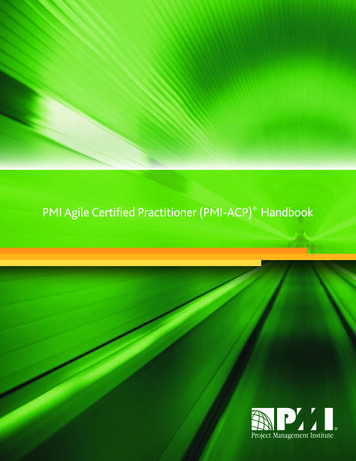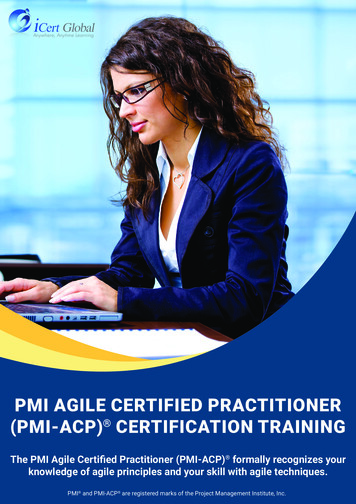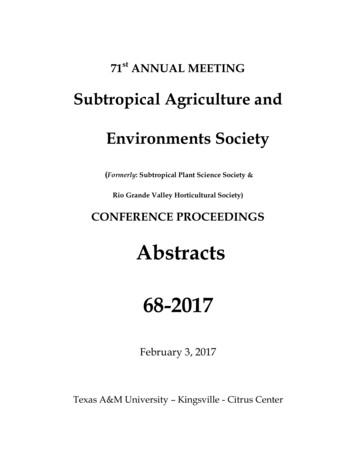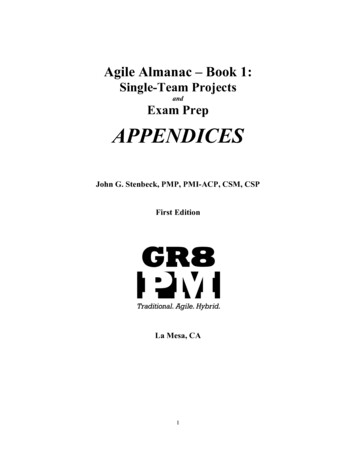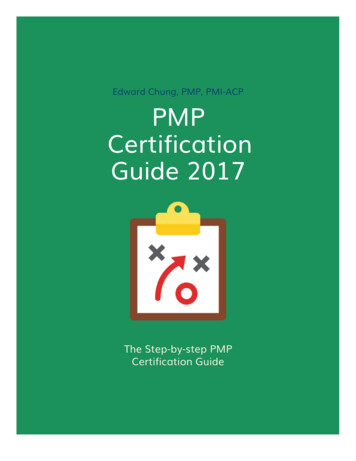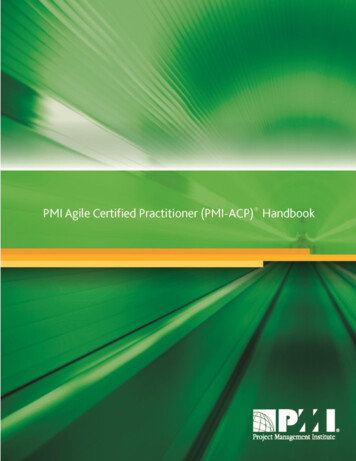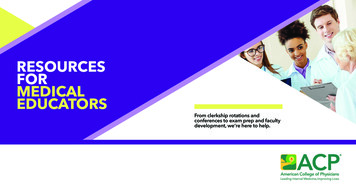
Transcription
RESOURCESFORMEDICALEDUCATORSFrom clerkship rotations andconferences to exam prep and facultydevelopment, we’re here to help.
Dear Colleague,At ACP, we believe education is critical to care quality, professionalwell-being, and the advancement of our profession. To assistyou in preparing learners for success, ACP has developed acomprehensive suite of resources for medical educators.Our educational resources offer a portfolio of high-quality,original, cutting-edge teaching tools that help you stay current inthe ever-changing landscape of academic medicine.This brochure outlines the breadth of ACP programs available toeducators across all aspects of medical education. It also includestips to help you use these resources to: Meet accreditation requirements Identify and remediate learners’ knowledge gaps Supplement and support your curriculum Teach evidence-based medicine and clinical reasoning Teach professionalism, systems-based practice,and quality improvement Provide opportunities to demonstrate scholarship Help your learners pass examinations Support faculty development Identify tools and resources for lifelong learningWe hope you will find these resources beneficial and consider usa trusted partner in your medical education programs. If you haveany questions about the teaching tools listed in the brochure,have suggestions for additional resources, or would like to talkabout other ways ACP can support you and your learners, pleasedon’t hesitate to contact me at dchick@acponline.org.Sincerely,Davoren Chick, MD, FACPSenior Vice President, Medical EducationAmerican College of Physicians
TABLE OFCONTENTSIdentify Learning Gaps . 2Enhance Your Curriculum . 4Prepare Trainees for Exams . 11Demonstrate Scholarship/Enhance Your CV . 13ACP Publications to Enhance Medical Education . 15Resident Career and Well-Being Support . 16Resources for Chief Residents . 17Refine Clinical Teaching Pearls . 18Medical Education Support . 20All-Inclusive Resource Chart . 24
IDENTIFY LEARNING GAPSInternal Medicine In-Training Examination (IM-ITE )Identify Learning GapsThe Internal Medicine-In Training Examination (IM-ITE ) is developed bythe American College of Physicians in collaboration with the Alliance forAcademic Internal Medicine. The IM-ITE is modeled after the AmericanBoard of Internal Medicine’s Certification Examination and administeredannually at each residency program training site during a prescribedexamination window. Evidence has shown that the IM-ITE is the strongestknown predictor of ABIM Certification Examination performance.Use the score reports to provide educational counseling to residents,develop curricula, and validate the need for planned curricular changes.View the percentage of questions answered correctly by each examineeand their percentile rank. Review each resident’s list of structurededucational objectives associated with incorrectly answered questions todevelop personalized learning plans. Identify common gaps so you canadjust your curriculum accordingly.Developed by a committee of physician-experts in 11 subspecialty areasof internal medicine, the IM-ITE consists of 300 questions administeredover 9.5 hours (with breaks). The test questions are developed withsecond-year residents in mind and cover a wide spectrum of knowledgein internal medicine, including acute and chronic care, inpatient andambulatory problems, and essential clinical skills. All of the scoredquestions used in the IM-ITE are pretested to ensure an extremely highlevel of test reliability and validity.uTipS:2 Identify Learning GapsAlthough the IM-ITE is typically given in the second year, residents at allpostgraduate training years are encouraged to participate annually toidentify areas for improvement, set goals, and track progress over time.Faculty can also participate to identify their own learning gaps.
Medical Knowledge Self-Assessment Program (MKSAP )MKSAP is a continually updated, evidence-based body of knowledgeorganized into an all-inclusive learning system for both residents andpracticing physicians. This premier educational tool has recently beenenhanced to help educators identify, assess, and remediate knowledgegaps in your program.How to Identify Learning Gaps1. Use the MKSAP Residency Tracker feature to monitor progress at boththe program and individual level. Develop individualized learning plansand assign questions to provide targeted guidance and feedback.2. Flip the classroom! Assign a custom quiz or group of questions toyour residents before a small-group learning session and ask them toidentify questions they struggled with or want to discuss in more detailat their session.3. View progress reports on an individual and group level.4. Review residents’ responses to individual questions to identify potentiallearning gaps and areas of confusion on important content areas.uTipS:1. Begin your resident report with a MKSAP question related to one ofyour cases to actively engage learners in the subject matter.2. Use MKSAP to update your own knowledge, earn CME credits, andaddress your maintenance of certification requirements.Identify Learning Gaps 3
ENHANCE YOUR CURRICULUMBoard Prep Curriculum for ResidentsFoster group learning through interactive questions that have beencurated and peer-reviewed by educators like you. Ideal for residencyprograms, this is the most comprehensive prepackaged course in internalmedicine to prepare for the board certification exam. It is also useful inpreparing lectures. Course map is providedBased on the ABIM blueprint98 hours of interactive content broken down into one-hour lectures3,300 slides with case-oriented questionsuTipS:1. The Board Prep Curriculum can be used in any setting—for a completelocal course, to launch individual lectures, or even during a noonconference.2. Encourage individual use by your residents as review material for theircourses or for the certification exam. The curriculum is purchasedbased on having a “.edu” email address. Therefore, residents with thesame “.edu” extension can access the curriculum at any time to reviewthe 230 sample questions.4 Enhance Your Curriculum
Prepackaged Mini-curriculaCritical Care Video ShortsCaring With CompassionHigh Value CareThis unique training series is aninnovative way to prepare your internsfor their initial critical care rotations, orprovide a review of important critical caretopics for more advanced residents andpracticing physicians.This comprehensive, Web-supported curriculumcontains approximately 10 hours of case-basedcontent focused on caring for socioeconomicallydisadvantaged patients. The course addressespublic insurance and public health deliverysystems, social determinants of health, teamcare, biopsychosocial health, and specialbiomedical concerns for homeless populations.A complete guide for educators is included.Developed jointly with the Alliance for Academic InternalMedicine (AAIM), ACP offers two different high-value carecurricula to residents and second-year subspecialty fellows,as well as interactive online cases that can be used byresidency programs in a flipped classroom. Designed tohelp trainees learn how to evaluate the value of their care,each curriculum addresses systems-based practice andpractice-based learning and improvement—knowledgethat is excellent preparation for the transition fromfee-for-service to value-based payment.It provides essential content needed forintensive care practice. Presented in 2- to5-minute key segments in an engaginganimated white board style, these highquality, educational videos can be viewedany time, in any order, and are mobilefriendly.uTip:Encourage your learners to watch a videoand then teach the content to their peersduring rounds.uTipS:uTipS:1. Encourage your learners to use the free,individualized learning dashboard to sharetheir progress with you for documentationof completion.1. Each of the 6-7 modules per curricula can bepresented independently. The accompanyingcurriculum guide gives ideas for presentationto maximize active learning opportunities.2. Use the supplementary “CareConsequences” game to encourage activelearning in a fun, low-risk format.2. The curricula include faculty toolboxes that include preand post-surveys so you can assess the effectivenessof the curriculum. Additional resources can help youaddress competence milestones in high-value care.Enhance Your Curriculum 5
Syllabus DevelopmentACP Journal Club ACP JournalWise Point-of-Care UltrasoundThis monthly Annals of Internal Medicinefeature highlights 10 high-quality, clinicallyrelevant articles from over 120 journalsthat internists should know about.This literature alert service lets youpersonalize how you receive informationabout new articles by selecting specialtyareas, clinical topics, article quality, journals,and alert frequency.New! This collection of interactive, online,multimedia learning provides essentialbackground knowledge that prepares learnersfor hands-on instruction. Topics coveredinclude obtaining adequate clinical imagesfor interpretation, deep venous thrombosis,lung ultrasound, focused cardiac imaging,abdominal free fluid, and urinary system.uTip:When developing your syllabus,use ACP Journal Club to identifyarticles relevant to your content area.Then use the content and analysisto launch a teaching discussion.6 Enhance Your CurriculumuTipS:1. Set your preferences to identify articlesrelevant to your teaching activities.Don’t miss sharing important newinformation with your learners.2. Create and share folders of articles withyour trainees for journal club, morningreport, or teaching rounds.uTipS:1. Assign ACP POCUS multimedia trainingprior to hands-on small-group education.2. Faculty development for POCUS isavailable through ACP’s live POCUStraining courses that provide small-grouplearning on live models with feedback fromexpert faculty.
Evidence-Based MedicineACP Clinical Guidelines andRecommendationsApplicable to all levels of training, ACP’sClinical Guidelines and Recommendationsprovide unbiased, evidence-basedmaterial to support rational conclusionsand recommendations. They meet thestandards for development as set by theNational Academy of Medicine and theGuidelines International Network andprovide a solid framework for teachingclinical reasoning.Topics include lower back pain, diabetes,and depression.uTip:1. Use ACP’s related mobile app to easilysearch and present guidelines whileteaching at the bedside or on rounds.In the ClinicThis monthly feature of Annals offersa deeper dive into common clinicalconditions. More than 150 topics havebeen covered to date, so there is a largebody of work to search in addition to newtopics discussed each month. Each In theClinic feature includes evidence-basedanswers to frequently asked questionsabout the condition and addresses theissue from screening to follow-up.uTip:In addition to assigning learners In theClinic as reading material, use the triggerquestions from Annals for Educators tofacilitate discussions during teachingsessions and rounds.Enhance Your Curriculum 7
Annals Resources for EducatorsIn addition to In the Clinic (page 7) and ACP Journal Club (page 6),get access to evidence-based content across the spectrum of internalmedicine from a variety of Annals-branded resources, applicable to alllevels of training.uTipS:1. Sign up to receive Annals for Educators emails. This twice-monthlyemail alert can help reduce prep time by offering tips for usingselected Annals articles in your teaching activities, including those onclinical topics as well as humanism and professionalism in medicine.2. Engage your learners with Beyond the Guidelines. Each multimediafeature in the series includes patient interviews and debates by clinicalexperts to help work through clinical reasoning techniques. Questionsare provided to challenge learners about real patient cases whosesituations don’t fit traditional guidelines.3. After watching an episode of Annals Consult Guys, our popularconsultative medicine talk show, use the related key resources andmultiple-choice questions for use in the classroom.4. Host a journal club by presenting a patient on your service with adiagnosis related to a recent Annals article or systematic review; asklearners to assess the strengths and weaknesses of the study andwhether the results apply to your patient.8 Enhance Your Curriculum
Interactive Learning ToolsDoctor’s Dilemma Foster healthy competition among your residentsby arranging them into teams and conducting a live“medical quiz bowl.” Use questions from ACP’s Doctor’sDilemma mobile app or from MKSAP to set up yourgame, and then send the winning team to compete atyour local chapter meeting. Chapter winners are eligiblefor the national competition.uTipS:1. Give categories to your residents in advance tostimulate learning.2. Use audience-response systems to engagelarger group-learning.Enhance Your Curriculum 9
Getting It Right:Cases to Improve DiagnosisDeveloped in collaboration withthe Society to Improve Diagnosisin Medicine, these interactive casestudies address the diagnosticprocess and how problems can occur.They encourage thinking arounddiagnostic decision making throughrecognition and analysis of diagnosticerrors and how to respond to them.uTip:Start your conference with one ofthese patient cases, and discuss howpotential diagnostic errors couldaffect the patient as well as thelearners’ daily practice of medicine.10 Enhance Your CurriculumACP AdvanceThis online curriculum offers a practical, stepwiseapproach to help clinicians engage in qualityimprovement and helps meet your program’sACGME QI requirement. This curriculum featuresa series of four interactive modules that walkyou through each step of the QI journey, fromestablishing the “what” and “why” for change, toimplementing and sustaining improvements.The curriculum integrates several core principleskey to achieving success, including: Clinician engagement and ownership Team-based care Patient and family partnership Maximizing efficiency while minimizing burden.uTipS:1. Each module of the curriculum can beaccessed independently, allowing you tonavigate through the modules freely.2. The ACP Advance QI worksheets are availableto download and share with your learners.
PREPARE TRAINEES FOR EXAMSMedical Knowledge Self-Assessment Program (MKSAP)Prepare your residents for the ABIM certification exam with MKSAP, themost trusted internal medicine self-assessment program. MKSAP 18provides an individualized dashboard to track learning progress. ForMKSAP Complete subscribers, adaptive flashcard technology supportsrecall of key information. All ACP Resident/Fellow Members receive acomplimentary copy of Board Basics (available in print or e-book) withtheir MKSAP 18 subscription, providing them with proven test-takingstrategies, study tables, and additional case histories for review. Plus, weoffer a money-back guarantee.uTipS:1. Residency programs receive a discount on bulkpurchases of MKSAP for their residents.2. MKSAP is also useful for identifying learning gaps;see page 3.Prepare Trainees for Exams 11
Live Board Review CoursesOffered regionally between May and July, ACP’s live board review coursesare the most cost-effective, in-person, initial certification preparationcourses available for first-time test-takers.ACP Board Review Course Recordings: CertificationResidents can study at home and at their own pace. This 45-hour programincludes recordings of our live courses broken down into 49 lectures, withonline prompts to answer questions as they navigate the course.uTipS:1. Both our live courses and recordings include a set of more than 200digital flashcards to reinforce key concepts prior to the exam.2. ACP offers a board prep guarantee with our courses and recordings—if your learner attends a course and does not pass the ABIM exam,they can attend another course for free or obtain free access to therecordings within a year of their ABIM failure notification date.12 Prepare Trainees for Exams
DEMONSTRATE SCHOLARSHIP/ENHANCE YOUR CVAbstracts ProgramACP offers abstract competitions locally within its chapters as well as nationally at theannual ACP Internal Medicine Meeting.Learner Involvement Medical students, residents, and subspecialty fellows are eligible to submit contentin the categories of Basic Research, Clinical Research, Quality Improvement-PatientSafety, High Value Care, and Clinical Vignette Selected abstracts are eligible for poster presentation and the top winners givepodium presentations, both of which are valuable additions to their CV anddemonstrate scholarship The national program now offers an electronic submission platform, making it eveneasier for your trainees and young faculty to submit their work for considerationFaculty & Early Career Physician Involvement Early career teaching faculty are eligible to submit abstracts to ACP’s nationalcompetition in designated peer categories Established faculty are encouraged to volunteer as judges for both local chapter andnational competitions, growing their professional connections while enhancing their CVDemonstrate Scholarship/Enhance Your CV 13
Doctor’s Dilemma CompetitionRecognize scholarship by sending thewinning team from your institution tocompete at your local ACP chaptercompetition. If they win the localcompetition, they’ll be sent to the nationalcompetition and gain further exposure.Volunteers are also often needed at eachlevel of the competition. (Note:For moredetails on how to use Doctor’s Dilemma toengage learners within your program, seepage 10.)14 Demonstrate Scholarship/Enhance Your CVACP-MIT Hackathon: HackingMedicineSubmit Content to Annalsfor Potential PublicationLearners, medical educators, and practicingclinicians are invited to submit anapplication to participate in the annual ACPMIT Hackathon, featured during sessions atthe annual Internal Medicine Meeting.Annals of Internal Medicine seekssubmissions of cover photos, On Beinga Doctor narratives, graphic narratives,case reports, brief research reports,letters, and more.Hackathons provide a unique platformto solve problems through intensecollaboration in a short amount of time.Join with advanced practice professionals,designers, pharmacists, technologists,nurses, social workers, developers, patients,and others. Together, small interprofessionalteams build innovative solutions to real-lifeproblems, and leave with new insights intosolving the challenges of implementingteam-based care.Noteworthy research articles may also besubmitted to Annals of Internal Medicine.The overall acceptance rate of originalresearch articles in Annals is highlycompetitive; however, authors receive acopy of the peer reviewers’ commentson their article so they can makeimprovements if it is not selected forpublication.
ACP PUBLICATIONS TO ENHANCE MEDICAL EDUCATIONTeaching Medicine SeriesWritten for educators across the spectrum of academic medicine, ACP’s TeachingMedicine 7-book series summarizes the collective experience and wisdom of expertmedical educators. Topics include theory, practice, methods of teaching medicine,teaching in the office or hospital, teaching clinical reasoning, and mentorship.Additional Publications of InterestThese ACP publications are also useful in the classroom oras ancillary reading material for your learners: ACP Handbook of Women’s HealthFenway Guide to Lesbian, Gay, Bisexual, and Transgender Health, 2nd EditionHow to Report Statistics in Medicine, 2nd EditionHow to Write, Publish, and Present in the Health SciencesPhysician’s Guide to End-of-Life CarePractical Office OrthopedicsPrinciples and Practice of Hospital Medicine, 2nd EditionPsychiatry Essentials for Primary CareACP Publications to Enhance Medical Education 15
RESIDENT CAREER AND WELL-BEING SUPPORTIMpowerACP IMpower is a program developed to support residents during their trainingand catalyze their professional future. Non clinical tools and resources craftedby ACP leaders, experienced internists, and prominent podcasters, cover a widevariety of topics valuable to residents at every stage of their training, and beyond.Coming Soon: Online Resident Well-being CurriculumThis flexible resource can help your residency program tackle the challenge ofresident burnout. Designed to be used as a flipped classroom, residents willreview the online material prior to the live class: and the instructor will then leadan in-depth discussion on the topic. The curriculum consists of four modules, eachfocused on a different aspect of well-being, which can be taught individually or asa complete curriculum.FREE to ACP members and all residency programs that have achieved RewardsStatus as part of ACP’s Reward-a-Resident Program (see page 23).16 Resident Career and Well-Being Support
RESOURCES FOR CHIEF RESIDENTSACP Chief Resident’s CornerACP provides resources specifically to help Chief Residents in theirteaching role. These include: Content focused on how to test and assess resident knowledgeand skill levels Prepackaged slides on how to present as a physician Webinars on transitioning from evaluated to evaluator, bedsideteaching, and making your lectures pop Regular e-newsletters with tips and tools for Chiefs Podcast series available exclusively to Chief Residents Scholarship program for Chiefs to help teach popular clinicalskills workshops under the guidance and mentorship of expertfaculty at the annual ACP Internal Medicine MeetingResources for Chief Residents 17
REFINE CLINICAL TEACHING PEARLSWhile Earning CME and MOCOnline Learning CenterInternal Medicine MeetingAccess a dynamic collection of more than 350 interactive learning activities.Sourced from numerous ACP resources, the highest-quality education is availablein an online, modular learning format. You can earn CME credit and MOC pointsfor most activities. Meet state-based requirements for Ethics & Professionalism,Pain Management, Opioid Management, Human Trafficking, and more.ACP’s annual Internal Medicine Meeting is the premiereducational event in internal medicine. The meetingspans three days of intensive learning and offers over 200scientific sessions. It’s an opportunity for all of internalmedicine to share knowledge, exchange ideas, experiencea sense of collegiality, and earn MOC/CME points.Internal Medicine Meeting RecordingsGet the key takeaways from ACP’s annual Internal MedicineMeeting with recordings available in either video or audioformat. A variety of packages is available, all of which allowyou to create a learning schedule that meets your needs.CME credit and MOC points are available.18 Refine Clinical Teaching Pearls
PodcastsWhether you’re interested in lively discussions on clinically influentialAnnals articles, the history of medicine, or informal dialog andinterviews with internal medicine experts addressing the wide scope ofinternal medicine practice, ACP has a podcast for you. ACP members:listen, learn, and earn free CME credit and MOC points when youengage with one of our four podcasts: Annals On Call, BedsideRounds, Core IM, and The Curbsiders.Annals In the ClinicIn the Clinic articles appear in the first print issues of Annals ofInternal Medicine each month, and are developed by the editors incollaboration with external physician writers. They provide evidencebased, practical information on common problems encountered bypracticing generalists or hospitalists. Some of In the Clinic’s sourcematerial includes MKSAP, ACP clinical guidelines, and practiceimprovement modules. A MKSAP-based quiz accompanies each issueand includes 4-5 questions, allowing readers to obtain CME and MOCpoints upon completion.Refine Clinical Teaching Pearls 19
MEDICAL EDUCATION SUPPORTAdvocacy and Public PolicyACP has an ongoing commitment to support and improvethe graduate medical education (GME) system. We havepublished policy papers and conduct ongoing advocacy aboutGME financing, redesigning residency training, addressingthe resident physician shortage and other workforce needs,opposing the immigration ban in terms of its impact onmedical education, medical student personal and family leavesof absence, and more.Relationships and CollaborationsACP has excellent relationships with medical educationorganizations, such as the Alliance for Academic InternalMedicine and Society of General Internal Medicine, ensuringour voice is heard. We have also collaborated with more than45 professional medical societies on a number of publicstatements that impact internists and our patients.20 Medical Education Support
Annals Fresh LookThis Annals blog is a forum for thoughts and reflections on Annals contentwritten by residents, subspecialty fellows, and other early career physiciansin general and subspecialty internal medicine. Medical students, medicaleducators, and others interested in the training and experience of earlycareer physicians are also welcome to submit content. Encourage yourlearners to read the content and interact with colleagues, and encouragefaculty to read the blog so they can learn about and understand theperspectives of their trainees.Medical Education Support 21
Rewards ProgramsInternal Medicine Interest Group (IMIG)Sponsorship ProgramThe IMIG Sponsorship Program provides funding,resources, and learning opportunities to U.S. medicalschool groups to support their interest in internalmedicine. Clubs complete an online application on anannual basis. This entitles them to 200 in initial funding atthe beginning of the academic year and an opportunity toearn additional support based on their recruitment of ACPMedical Student Members.22 Medical Education Support
Reward-a-Resident ProgramIf 90% or more of a participating program’s categoricalinternal medicine or medicine-pediatrics residents areACP Resident/Fellow Members in good standing whenthe recruitment period closes (December 31, annually),that residency program will achieve Rewards Status. Eachresident in that program will then receive a selection offree educational resources, including:1. Unlimited program-wide access to ACP’snew Critical Care Video Shorts2. ACP Internal Medicine Meeting handouts3. In the Clinic compendium4. Procedural short videos5. Resident Well-being CurriculumMedical Education Support 23
INNOVATIVE AND CUTTING-EDGESOLUTIONS FOR ACADEMIC MEDICINETeaching ialtyFellowsFacultyACP Abstract CompetitionsllllACP Clinical Guidelines/Guidelines AppllllAudienceResponseEnhance ingand CompetitionEducation BenefitLaunch aLectureRun a JournalClublllllACP JournalWisellllllAnnals Fresh LookllllAnnals In the CliniclllllCaring with Compassion for the Underserved CurriculumllCritical Care Video ShortslDoctor’s DilemmallHigh Value Care CurriculalllllInternal Medicine Meeting scholarships for Chief ResidentsllMKSAP (including the Residency Tracker)POCUS24 Innovative and Cutting-Edge Solutions for Academic llllResident Well-Being CurriculumlllllllInternal Medicine In-Training Exam (IM-ITE)lllllllllTeach EvidenceBased MedicinellGetting It Right: Cases to Improve DiagnosisInternal Medicine Meeting tracks for students and residentslllSupport High-Value Care/Quality ImprovementllBoard Review Courses and RecordingsPrepare Learnersfor ExamslllDemonstrateScholarshipllBoard Prep CurriculumAssess and RemediateMedical KnowledgelACP Journal ClubAnnals Resources for EducatorsRun ResidentReportllllllllllllllllllInnovative and Cutting-Edge Solutions for Academic Medicine 25
acpinternistsFIND USONLINE!MD9296
4. Review residents’ responses to individual questions to identify potential learning gaps and areas of confusion on important content areas. uTipS: 1. Begin your resident report with a MKSAP question related to one of your cases to actively engage learners in the subject matter. 2. Use MKSAP
